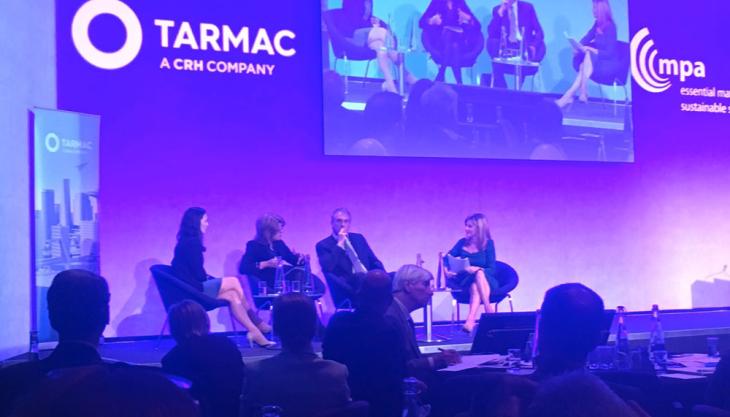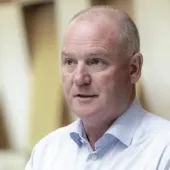Mineral Products 2017

MPA annual conference highlights key challenges of adapting to change and need for greater collaboration
AN audience of 180 high-level delegates from more than 90 member companies and stakeholders attended this year’s MPA members’ annual conference ‘Mineral Products 2017 – Adapting to Change’, which took place on Wednesday 7 June at the Queen Elizabeth II Conference Centre, in Westminster, London.
Held the day before the General Election, the event – themed ‘Facing the Challenges… Showcasing the Industry – was hosted by BBC Radio 4 Today programme presenter Justin Webb and broadcaster Andrea Catherwood, who both managed expert panel discussions, including an interactive debate addressing the challenges posed by Brexit from UK, European and global perspectives.
The main proceedings began with a welcome by Sir Simon Vivian, chairman of the MPA, who also officially launched the organization’s new Charter. Signed by all MPA full-producer members, it is designed to help the industry achieve a new vision for 2025 by ‘driving change, raising standards and improving perceptions’.
In his opening address, Mr Vivian set the tone for the conference with a brief talk on why addressing and understanding uncertainty, in the face of Brexit, is becoming an even more important part of business planning. He said: ‘Our industry continues to be ready to support delivery of Government’s agenda for developing and improving the built environment in post-Brexit Britain.’
Mr Vivian also stressed the importance of delivering a modern and relevant industrial strategy, but said it must be one that encourages all industries throughout the UK. ‘Reducing the tax burden and cutting and improving red tape can play an important role and will help us improve productivity and maintain competitiveness for the benefit of the economy and our quality of life,’ he explained.
‘Our industrial competitiveness must be protected at all costs, which is why the ultimate shape of the deal with the EU matters, as this will define access, not only to important European markets, but more significantly to both skilled and ‘less-skilled’ labour.’
Keynote speaker Sir Simon Fraser, managing partner at Flint Global, spoke about the world in flux, highlighting that the ‘nature of change is changing’, and that every year is now a revolutionary year and that the pace of change leads to loss of confidence in quality of political leaders and their ability to deliver.
The conference’s interactive panel sessions focused on a number of major developments affecting the industry. The first – with Sir Simon Fraser, Vicky Pryce, board member of the Centre for Economics and Business Research, and Jessica Gladstone, partner at Clifford Chance – discussed Brexit and the likely view from Europe.
The second panel session – with Professor Vernon Bogdanor of Kings College London, Josh Hardie, deputy director-general for policy and campaigns at CBI, and Jill Rutter, programme director at Institute for Government – gave insights into the view from Brexit Britain and the many practical challenges posed by securing the ‘best possible deal’.
The third panel session speakers – James Warren, research fellow at National Institute Of Economic and Social Research, and Luc Tucker, senior analyst for OBR – indicated that productivity is the biggest issue facing the economy.
The day finished with a debate between Daniel Mahoney, deputy director and head of economic research at the Centre for Policy Studies, and Vicky Pryce on the UK’s industrial strategy.
Commenting on the event, Nigel Jackson, chief executive of the MPA, said: ‘The day helped delegates appreciate the wide range of challenges facing the UK in the coming months and years from a global, European and UK perspective. It is clear that government should be listening more to experts who really understand the ‘nitty gritty’ issues relating to international trade and business and industry, with regards to the economy.
‘Let’s hope that the new Government taps into the vast amount of goodwill and ‘can do’ resources available to it from industry. It is in everyone’s interests to secure a successful Brexit. We need a lot less political dogma and a lot more pragmatism and collaborative working as we leave the EU.’









